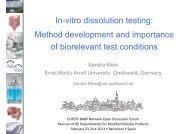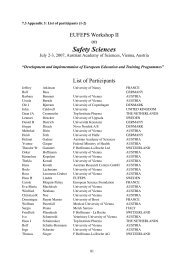2011 Anniversary Yearbook - EUFEPS today and history
2011 Anniversary Yearbook - EUFEPS today and history
2011 Anniversary Yearbook - EUFEPS today and history
Create successful ePaper yourself
Turn your PDF publications into a flip-book with our unique Google optimized e-Paper software.
subjects during their under graduate<br />
training in order that motivation <strong>and</strong><br />
suitability for a research career (Ph.D.<br />
training) can be evaluated at the time<br />
of graduation. Preferably such training<br />
should be undertaken in a high quality<br />
<strong>and</strong> stimulating re search environment <strong>and</strong><br />
include a training period abroad, either<br />
at another university or in an industrial<br />
research institute. Internationalization,<br />
mobility, flexibility, interdisciplinarity in<br />
basic research competence are key words<br />
in this respect. Subsequent graduate studies<br />
<strong>and</strong> research should be undertaken by the<br />
best qualified students <strong>and</strong> should lead to<br />
independent <strong>and</strong> creative researchers at the<br />
time of obtaining this Doctor’s degree. In<br />
the Newsletter of the Academia Europaea<br />
(November 1993) it is outlined by the<br />
Swedish Minister for Education <strong>and</strong> Science<br />
that this country will invest heavily during<br />
the coming years in education <strong>and</strong> research<br />
in an international context <strong>and</strong> that the<br />
number of doctoral exams in Sweden will<br />
have to be doubled by the year 2000. This<br />
is surely also in the interest of the (Swedish)<br />
pharmaceutical industry <strong>and</strong> should serve<br />
as an excellent example for other European<br />
countries to follow.<br />
An important question is to what<br />
extent our universities, <strong>and</strong> in particular its<br />
faculties of pharmacy <strong>and</strong> pharmaceutical<br />
sciences in Europe, are willing <strong>and</strong><br />
capable of accommodating the future<br />
needs of innovation in drug research<br />
<strong>and</strong> development. There is, in my view,<br />
no doubt that the overall willingness is<br />
there, but that there are in many places<br />
also major obstacles to engage in high<br />
quality re search <strong>and</strong> therefore also in<br />
the research training of excellent young<br />
pharmaceutical scientists. These obstacles<br />
include the fact that in most faculties or<br />
institutes the orientation centres primarily<br />
on the training of pharmacists rather than<br />
pharmaceutical scientists. In only a few<br />
countries are undergraduate programmes<br />
offered which may also effectively lead<br />
to a research career as described above.<br />
Furthermore, in many instances pharmacy<br />
programmes are heavily taught rather<br />
than research oriented; this is partially<br />
caused by large numbers of students<br />
<strong>and</strong>/or by lack of resources for research<br />
with no competitive basis for successful<br />
application for external grants. Also<br />
the organizational structure in terms of<br />
monodisciplinarity is an inhibiting factor<br />
in developing cross-disciplinary re search<br />
programmes, as is the lack of participation<br />
in international research networks.<br />
In order to improve this current<br />
unsatisfactory situation it is necessary<br />
to remind our selves of some of the<br />
conditions which are required to perform<br />
high quality research. A major issue<br />
in this respect is the development <strong>and</strong><br />
implementation of an effective research<br />
strategy which should exhibit most of the<br />
following characteristics:<br />
• the establishment <strong>and</strong> creation of a<br />
stimulating <strong>and</strong> creative environment<br />
through building research around<br />
excellent <strong>and</strong> motivated scientists;<br />
• the ab<strong>and</strong>onment of hierarchical<br />
levels, i.e. much autonomy for<br />
individual scientists;<br />
• appreciation of individual scientist’s<br />
initiatives (self expression), within the<br />
con text of the overall research mission<br />
of an institute or a faculty;<br />
• encouragement of working in<br />
multidisciplinary teams;<br />
• emphasis on research output through<br />
publications in first class peer reviewed<br />
international journals <strong>and</strong> through<br />
patent applications;<br />
• effective decision making on research<br />
orientation, budget allocation <strong>and</strong><br />
incentives.<br />
Once this research strategy is agreed<br />
upon, an effective organizational structure<br />
will be required for its implementation. In<br />
this respect, an important development<br />
in Europe is the creation of so-called<br />
“research schools”. These are defined as<br />
university based re search institutes of<br />
international st<strong>and</strong>ing which provide the<br />
structural environment for high quality<br />
research training. The reasons for the<br />
establishment of such “schools” are:<br />
• improved quality of research training<br />
in a multidisciplinary environment<br />
(combined undergraduate <strong>and</strong> graduate<br />
research programmes with great<br />
emphasis on highly qualified Ph.D.’ s;<br />
• enhanced efficiency of the use of<br />
research resources;<br />
• matching human resources for research<br />
to science policy priorities, i.e. taking<br />
serious account of the research needs in<br />
the public sector (e.g. the pharma-<br />
ceutical industry);<br />
• enhancement of international<br />
collaboration <strong>and</strong> exchange of staff <strong>and</strong><br />
students.<br />
Such research schools may have a “local”<br />
character, i.e. be established within a single<br />
IX<br />
university that contains all necessary<br />
disciplines. More often, however, it will<br />
have a “network” character with several<br />
departments of different universities <strong>and</strong><br />
complementary expertise collaborating.<br />
In my own country, the government is<br />
strongly stimulating the establishment of<br />
re search schools. The Royal Netherl<strong>and</strong>s<br />
Academy of Arts <strong>and</strong> Sciences has<br />
been given the responsibility to review<br />
applications for such· a recognition. High<br />
quality research <strong>and</strong> graduate teaching,<br />
as well as an organizational structure as<br />
outlined above, belong to the most important<br />
recognition criteria with preferably<br />
more than one university participating<br />
in a school. Two such schools have been<br />
established for the pharmaceutical sciences:<br />
in 1992, the Leiden-Amsterdam Center for<br />
Drug Research (LACDR), comprising the<br />
Center for Bio-Pharmaceutical Sciences at<br />
Leiden University <strong>and</strong> the Department of<br />
Pharmacochemistry of the Yrije Universiteit<br />
in Amsterdam <strong>and</strong> in 1994 the Groningen-<br />
Utrecht Institute for Drug Exploration<br />
(GUI DE), that consists of the faculties of<br />
pharmacy of the University of Groningen<br />
<strong>and</strong> that of Utrecht. LACDR is further<br />
Europeanized in ULLA, a consortium<br />
for postgraduate research training in the<br />
pharmaceutical sciences together with<br />
the Faculties of Pharmacy in Uppsala <strong>and</strong><br />
London. There is currently a committee of<br />
EU Member States investigating the need<br />
for similar developments in other European<br />
countries. For the pharmaceutical sciences<br />
<strong>and</strong> the training of pharmaceutical<br />
scientists, this should represent an important<br />
development towards meeting the needs of<br />
the pharmaceutical industry in Europe in<br />
the future.<br />
One could think of different<br />
organizational models to accommodate<br />
this, but most of the basic elements<br />
indicated in this Editorial should be<br />
implemented in order to make such an<br />
organization successful.<br />
Most likely, new organizational<br />
structures are needed for the<br />
pharmaceutical sciences in Europe in<br />
order to improve the quality of research<br />
training. Such structures could still<br />
be closely associated with Faculties of<br />
Pharmacy, but their mission should be<br />
clearly differentiated from the training of<br />
pharmacists <strong>and</strong> focus on pharmaceutical<br />
sciences. In my view, this is a prerequisite<br />
guaranteeing that the three issues as<br />
discussed are fully met <strong>and</strong> appreciated<br />
through university industry partnerships.




